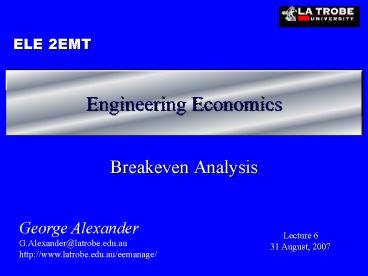Engineering Economics - PowerPoint PPT Presentation
1 / 29
Title:
Engineering Economics
Description:
... pays a price for raw materials, it is part of the cost of manufacturing an item. ... Variable costs are impacted by efficiency of operation, improved design, ... – PowerPoint PPT presentation
Number of Views:24
Avg rating:3.0/5.0
Title: Engineering Economics
1
Engineering Economics
- Breakeven Analysis
Lecture 6 31 August, 2007
2
Lecture Topics
- Introduction
- Cost Price
- Fixed and variable costs
- Breakeven point
- Comparing alternatives
3
Introduction
- Breakeven analysis, in general, is an important
step in the business planning process. - It is the transition point between negative and
positive total cash flow. - It is used in comparing two or more alternatives.
- It is helpful in the decision making process on
such issues like make-or-buy.
4
Cost Price
- Cost and Price do not mean the same thing.
- The price charged by a manufacturer for an item
is cost markup. - The manufacturer pays a price for raw materials,
it is part of the cost of manufacturing an item. - Produce an item at a cost and sell it for a
price.
5
Total Costs (TC)
- Fixed Costs (FC)
- Buildings (rent, depreciation, outgoings, etc.)
- Insurance
- Fixed overhead
- Equipment (lease, depreciation, etc.)
- Indirect labour (salaries)
- Variable Costs (VC)
- Materials
- Direct labour
- Contractors
- etc.
6
Fixed Costs (FC)
- Essentially constant for all values of the
variable in question - Not affected by level of (business) activity
- Fixed costs may be optimised for an efficient
operation - Fixed costs are optimal for maximum utilisation
of plant capacity
7
Typical Characteristics of FC
FC 3
FC 2
FC 1
Quantity
8
Variable Costs (VC)
- Variable costs change with the level of activity
- More activity - greater variable costs
- Less activity - lower variable costs
- Variable costs are impacted by efficiency of
operation, improved design, quality, safety, and
higher sales volume - Variable costs should be correlated to revenue
and profit
9
Total Costs
- Total Cost Fixed Costs Variable Costs
- TC FC VC
- Profit Relationship
- Profit Revenue - Total Cost
- P R - TC
- P R - (FC VC)
10
Profit
Revenue
Variable Costs
Fixed Costs
11
Linear Cost Relationship
TC FC VC
Total Costs
Cost per year
Variable Costs
Fixed Costs ( level)
Q units per year
12
Non-linear Cost Relationship
TC FC VC
Total Costs
Cost per year
Variable Costs
Fixed Costs ( level)
Q units per year
13
Revenue
Linear
nonlinear-increasing
nonlinear-decreasing
Revenue / year R
Q units per year
14
Breakeven Point
- The breakeven point is the intersection of the
two functions Revenue (R) and Total Cost (TC) - Profit Revenue - Total Cost
- P R - TC
- Now let Profit 0
- 0 R - TC R TC
15
Breakeven Point
TC
R
QBE
Q units per year
16
Variable Costs and QBE
17
Maximum Profit
18
Two Alternative Analysis
- Given two alternatives (mutually exclusive)
- Determine a common variable or an economic
parameter common to both alternatives - It could be
- Interest rate,
- First cost (investment),
- Annual operating cost,
- Etc.
19
Breakeven for two alternatives
- Common analysis considers
- Revenue or
- Costs
- Common to both options.
- Assume a linear revenue-cost relationship
20
Two Alternatives
21
Two Alternative Analysis
- The preferred approach is to define either
- Present worth relationships or,
- Annual worth relationships and,
- Set the two expressions equal and solve for the
parameter or variable of interest.
22
Three Alternative Analysis
- If three alternatives are present
- Compare the alternatives pair-wise or,
- Use a spreadsheet model to plot the present
worth or annual worth over a specified range of
values. - A typical three alternative plot might look like
.
23
Three Alternatives
24
Self-Study Task
In the textbook, go through examples 13.3 and
13.4 which illustrate the Annual Worth approach
to evaluating alternatives in terms of breakeven
analysis. Refer photocopy with notes.
25
Example AW/Breakeven
- Refer 2004 assignment Part 2, Q4
- Question and solution are on the website.
26
Example AW/Breakeven 2004 assignment Part 2,
Q4 refer web
27
Solution AW/Breakeven 2004 assignment Part 2,
Q4 refer web
28
References
- Blank, L., Tarquin, A., Engineering Economy,
McGraw-Hill, 5/e - Chapter 13
29
Thanks for your attention































